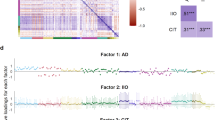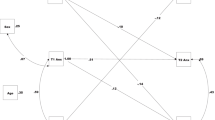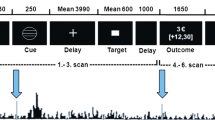Abstract
Delay discounting is the tendency for individuals to devalue a reward as time to receipt of the reward increases. Rates of delay discounting describe to what extent one prefers smaller rewards delivered immediately over larger rewards delivered at a delay. Discount rates vary among individuals, and authors have suggested that abnormal discount rate may represent a transdiagnostic process implicated in multiple psychiatric disorders. However, further research is needed on how discount rate may relate to anxiety symptomatology and formally diagnosed anxiety disorders. Thus, the present study, in a sample of individuals with heterogeneous anxiety disorders and healthy controls, examined how monetary discount rate related to dimensional measures of anxiety symptomatology as well as diagnoses of generalized anxiety disorder (GAD), social anxiety disorder (SAD), and panic disorder (PD). In addition, we examined how discount rate related to physiological startle response (i.e., fear-potentiated and anxiety-potentiated startle). From 2019 to 2022, adults with a formal diagnosis of GAD, SAD, and/or PD (N = 89) and healthy controls (N = 66) completed dimensional measures of anxiety symptomatology; a hypothetical monetary delay discounting task that followed an adjusting titration procedure; and the neutral, predictable, and unpredictable (NPU) threat test. Correlational analyses revealed that discount rate was not significantly associated with any dimensional measure of anxiety (ps ≥ .31); logistic regressions controlling for appropriate covariates indicated that discount rate was not significantly associated with any anxiety disorder diagnosis (ps ≥ .14). In addition, discount rate was not significantly correlated with any measure of physiological startle (ps ≥ .22). We did find that completion of the delay discounting task during the pandemic was significantly associated with shallower (lower) discount rate. Overall, results suggest that monetary delay discounting paradigms might not represent a highly useful tool within the anxiety disorders field in particular, and the potential transdiagnostic role of abnormal discount rate, at least as measured with monetary discounting paradigms, might not extend to anxiety disorders. However, results should be interpreted cautiously given limitations such as the relatively small sample size, which precluded adequate statistical power to detect effects of small sizes.
Similar content being viewed by others
Data availability
Data analyzed and code generated for analyses are available from the corresponding author upon request.
References
Amlung, M., Vedelago, L., Acker, J., Balodis, I., & MacKillop, J. (2017). Steep delay discounting and addictive behavior: A meta-analysis of continuous associations. Addiction, 112(1), 51–62. https://doi.org/10.1111/add.13535
Amlung, M., Marsden, E., Holshausen, K., Morris, V., Patel, H., Vedelago, L., Naish, K. R., Reed, D. D., & McCabe, R. E. (2019). Delay discounting as a transdiagnostic process in psychiatric disorders: A meta-analysis. JAMA Psychiatry, 76(11), 1176. https://doi.org/10.1001/jamapsychiatry.2019.2102
Bailey, A. J., Romeu, R. J., & Finn, P. R. (2021). The problems with delay discounting: a critical review of current practices and clinical applications. Psychological Medicine, 51(11), 1799–1806. https://doi.org/10.1017/S0033291721002282
Bickel, W. K., Jarmolowicz, D. P., Mueller, E. T., Koffarnus, M. N., & Gatchalian, K. M. (2012). Excessive discounting of delayed reinforcers as a trans-disease process contributing to addiction and other disease-related vulnerabilities: Emerging evidence. Pharmacology & Therapeutics, 134(3), 287–297. https://doi.org/10.1016/j.pharmthera.2012.02.004
Carleton, R. M. (2012). The intolerance of uncertainty construct in the context of anxiety disorders: Theoretical and practical perspectives. Expert Review of Neurotherapeutics, 12(8), 937–947. https://doi.org/10.1586/ern.12.82
Craft, W. H., Tegge, A. N., Freitas-Lemos, R., Tomlinson, D. C., & Bickel, W. K. (2022). Are poor quality data just random responses?: A crowdsourced study of delay discounting in alcohol use disorder. Experimental & Clinical Psychopharmacology, 30(4), 409–414. https://doi.org/10.1037/pha0000549
Critchfield, T. S., & Kollins, S. H. (2001). Temporal discounting: Basic research and the analysis of socially important behavior. Journal of Applied Behavior Analysis, 34(1), 101–122. https://doi.org/10.1901/jaba.2001.34-101
Du, W., Green, L., & Myerson, J. (2002). Cross-cultural comparisons of discounting delayed and probabilistic rewards. The Psychological Record, 52(4), 479–492. https://doi.org/10.1007/BF03395199
Faul, F., Erdfelder, E., Lang, A.-G., & Buchner, A. (2007). G*Power 3: A flexible statistical power analysis program for the social, behavioral, and biomedical sciences. Behavior Research Methods, 39(2), 175–191. https://doi.org/10.3758/BF03193146
GBD 2019 Mental Disorders Collaborators. (2022). Global, regional, and national burden of 12 mental disorders in 204 countries and territories, 1990–2019: A systematic analysis for the Global Burden of Disease Study 2019. The Lancet Psychiatry, 9(2), 137–150. https://doi.org/10.1016/S2215-0366(21)00395-3
Green, L., & Myerson, J. (2004). A discounting framework for choice with delayed and probabilistic rewards. Psychological Bulletin, 130(5), 769–792. https://doi.org/10.1037/0033-2909.130.5.769
Gorka, S. M., Lieberman, L., Shankman, S. A., & Phan, K. L. (2017). Startle potentiation to uncertain threat as a psychophysiological indicator of fear-based psychopathology: An examination across multiple internalizing disorders. Journal of Abnormal Psychology, 126(1), 8–18. https://doi.org/10.1037/abn0000233
Hamilton, M. (1959). The assessment of anxiety states by rating. British Journal of Medical Psychology, 32(1), 50–55. https://doi.org/10.1111/j.2044-8341.1959.tb00467.x
Heimberg, R. G., Horner, K. J., Juster, H. R., Safren, S. A., Brown, E. J., Schneier, F. R., & Liebowitz, M. R. (1999). Psychometric properties of the Liebowitz Social Anxiety Scale. Psychological Medicine, 29(1), 199–212. https://doi.org/10.1017/s0033291798007879
Higgins, E. T. (1997). Beyond pleasure and pain. American Psychologist, 52(12), 1280–1300. https://doi.org/10.1037/0003-066X.52.12.1280
Hoge, E. A., Bui, E., Mete, M., Dutton, M. A., Baker, A. W., & Simon, N. M. (2023). Mindfulness-Based Stress Reduction vs escitalopram for the treatment of adults with anxiety disorders: A randomized clinical trial. JAMA Psychiatry, 80(1), 13–21. https://doi.org/10.1001/jamapsychiatry.2022.3679
Hoge, E. A., Armstrong, C. H., Mete, M., Oliva, I., Lazar, S. W., Lago, T. R., & Grillon, C. (2024). Attenuation of anxiety-potentiated startle after treatment with escitalopram or mindfulness meditation in anxiety disorders. Biological Psychiatry, 95(1), 85–92. https://doi.org/10.1016/j.biopsych.2023.06.003
Hurlemann, R., Scheele, D., Kinfe, T. M., Berger, R., Philipsen, A., Voncken, M. J., Kuypers, K. P. C., & Schruers, K. (2019). Increased temporal discounting in social anxiety disorder normalizes after oxytocin treatment. Psychotherapy & Psychosomatics, 88(1), 55–57. https://doi.org/10.1159/000495259
Jenks, C. W., & Lawyer, S. R. (2015). Using delay discounting to understand impulsive choice in socially anxious individuals: Failure to replicate. Journal of Behavior Therapy & Experimental Psychiatry, 46, 198–201. https://doi.org/10.1016/j.jbtep.2014.10.010
Johnson, M. W., & Bickel, W. K. (2002). Within-subject comparison of real and hypothetical money rewards in delay discounting. Journal of the Experimental Analysis of Behavior, 77(2), 129–146. https://doi.org/10.1901/jeab.2002.77-129
Johnson, M. W., & Bickel, W. K. (2008). An algorithm for identifying nonsystematic delay-discounting data. Experimental & Clinical Psychopharmacology, 16(3), 264–274. https://doi.org/10.1037/1064-1297.16.3.264
Klenk, M. M., Strauman, T. J., & Higgins, E. T. (2011). Regulatory focus and anxiety: A self-regulatory model of GAD-depression comorbidity. Personality & Individual Differences, 50(7), 935–943. https://doi.org/10.1016/j.paid.2010.12.003
Koffarnus, M. N., & Bickel, W. K. (2014). A 5-trial adjusting delay discounting task: Accurate discount rates in less than one minute. Experimental & Clinical Psychopharmacology, 22(3), 222–228. https://doi.org/10.1037/a0035973
Lecrubier, Y., Sheehan, D., Weiller, E., Amorim, P., Bonora, I., Harnett Sheehan, K., Janavs, J., & Dunbar, G. (1997). The Mini International Neuropsychiatric Interview (MINI). A short diagnostic structured interview: Reliability and validity according to the CIDI. European Psychiatry, 12(5), 224–231. https://doi.org/10.1016/S0924-9338(97)83296-8
Lempert, K. M., Steinglass, J. E., Pinto, A., Kable, J. W., & Simpson, H. B. (2019). Can delay discounting deliver on the promise of RDoC? Psychological Medicine, 49(2), 190–199. https://doi.org/10.1017/S0033291718001770
Levin, M. E., Haeger, J., Ong, C. W., & Twohig, M. P. (2018). An examination of the transdiagnostic role of delay discounting in psychological inflexibility and mental health problems. The Psychological Record, 68(2), 201–210. https://doi.org/10.1007/s40732-018-0281-4
Levitt, E. E., Oshri, A., Amlung, M., Ray, L. A., Sanchez-Roige, S., Palmer, A. A., & MacKillop, J. (2022). Evaluation of delay discounting as a transdiagnostic research domain criteria indicator in 1388 general community adults. Psychological Medicine, 53(4), 1649–1657. https://doi.org/10.1017/S0033291721005110
Liebowitz, M. R. (1987). Social phobia. Modern Problems of Pharmacopsychiatry, 22, 141–173. https://doi.org/10.1159/000414022
Mazur, J. (1987). An adjusting procedure for studying delayed reinforcement. In M. Commons, J. Mazur, J. Nevin, & H. Rachlin (Eds.), Quantitative analysis of behavior :The effect of delay and intervening events on reinforcement value (pp. 55–73). Lawrence Erlbaum Associates.
Odum, A. L. (2011). Delay Discounting: I’m a k, you’re a k. Journal of the Experimental Analysis of Behavior, 96(3), 427–439. https://doi.org/10.1901/jeab.2011.96-423
Pinto, A., Steinglass, J. E., Greene, A. L., Weber, E. U., & Simpson, H. B. (2014). Capacity to delay reward differentiates obsessive-compulsive disorder and obsessive-compulsive personality disorder. Biological Psychiatry, 75(8), 653–659. https://doi.org/10.1016/j.biopsych.2013.09.007
Radloff, L. S. (1977). The CES-D scale: A self-report depression scale for research in the general population. Applied Psychological Measurement, 1(3), 385–401.
Reimers, S., Maylor, E. A., Stewart, N., & Chater, N. (2009). Associations between a one-shot delay discounting measure and age, income, education and real-world impulsive behavior. Personality & Individual Differences, 47(8), 973–978. https://doi.org/10.1016/j.paid.2009.07.026
Reynolds, B., Richards, J. B., Horn, K., & Karraker, K. (2004). Delay discounting and probability discounting as related to cigarette smoking status in adults. Behavioural Processes, 65(1), 35–42. https://doi.org/10.1016/S0376-6357(03)00109-8
Robinson, O. J., Bond, R. L., & Roiser, J. P. (2015). The impact of threat of shock on the framing effect and temporal discounting: executive functions unperturbed by acute stress? Frontiers in Psychology, 6, 1315. https://doi.org/10.3389/fpsyg.2015.01315
Rounds, J. S., Beck, J. G., & Grant, D. M. (2007). Is the delay discounting paradigm useful in understanding social anxiety? Behaviour Research & Therapy, 45(4), 729–735. https://doi.org/10.1016/j.brat.2006.06.007
Ruscio, A. M., & Khazanov, G. K. (2017). Anxiety and depression. In R. J. DeRubeis & D. R. Strunk (Eds.), The Oxford handbook of mood disorders (pp. 313–324). Oxford University Press.
Safren, S. A., Heimberg, R. G., Horner, K. J., Juster, H. R., Schneier, F. R., & Liebowitz, M. R. (1999). Factor structure of social fears: The Liebowitz Social Anxiety Scale. Journal of Anxiety Disorders, 13(3), 253–270. https://doi.org/10.1016/s0887-6185(99)00003-1
Schmitz, A., & Grillon, C. (2012). Assessing fear and anxiety in humans using the threat of predictable and unpredictable aversive events (the NPU-threat test). Nature Protocols, 7(3), 527–532. https://doi.org/10.1038/nprot.2012.001
Shear, M. K., Brown, T. A., Barlow, D. H., Money, R., Sholomskas, D. E., Woods, S. W., Gorman, J. M., & Papp, L. A. (1997). Multicenter Collaborative Panic Disorder Severity Scale. American Journal of Psychiatry, 154(11), 1571–1575. https://doi.org/10.1176/ajp.154.11.1571
Shear, M. K., Vander Bilt, J., Rucci, P., Endicott, J., Lydiard, B., Otto, M. W., Pollack, M. H., Chandler, L., Williams, J., Ali, A., & Frank, D. M. (2001). Reliability and validity of a structured interview guide for the Hamilton Anxiety Rating Scale (SIGH-A). Depression & Anxiety, 13(4), 166–178. https://doi.org/10.1002/da.1033
Sheehan, D., Lecrubier, Y., Harnett Sheehan, K., Janavs, J., Weiller, E., Keskiner, A., Schinka, J., Knapp, E., Sheehan, M., & Dunbar, G. (1997). The validity of the Mini International Neuropsychiatric Interview (MINI) according to the SCID-P and its reliability. European Psychiatry, 12(5), 232–241. https://doi.org/10.1016/S0924-9338(97)83297-X
Sheehan, D. V., Lecrubier, Y., Sheehan, K. H., Amorim, P., Janavs, J., Weiller, E., Hergueta, T., Baker, R., & Dunbar, G. C. (1998). The Mini-International Neuropsychiatric Interview (M.I.N.I.): The development and validation of a structured diagnostic psychiatric interview for DSM-IV and ICD-10. Journal of Clinical Psychiatry, 59(Suppl 20), 22–57.
Spielberger, C. D. (1989). State-Trait Anxiety Inventory: Bibliography (2nd ed.). Palo Alto, CA: Consulting Psychologists Press.
Spielberger, C. D., Gorsuch, R. L., Lushene, R., Vagg, P. R., & Jacobs, G. A. (1983). Manual for the State-Trait Anxiety Inventory. Palo Alto, CA: Consulting Psychologists Press.
Steinglass, J. E., Lempert, K. M., Choo, T.-H., Kimeldorf, M. B., Wall, M., Walsh, B. T., Fyer, A. J., Schneier, F. R., & Simpson, H. B. (2017). Temporal discounting across three psychiatric disorders: Anorexia nervosa, obsessive compulsive disorder, and social anxiety disorder. Depression & Anxiety, 34(5), 463–470. https://doi.org/10.1002/da.22586
Xia, L., Gu, R., Zhang, D., & Luo, Y. (2017). Anxious individuals are impulsive decision-makers in the delay discounting task: An ERP study. Frontiers in Behavioral Neuroscience, 11, 5. https://doi.org/10.3389/fnbeh.2017.00005
Yi, R., Gatchalian, K. M., & Bickel, W. K. (2006). Discounting of past outcomes. Experimental & Clinical Psychopharmacology, 14(3), 311. https://doi.org/10.1037/1064-1297.14.3.311
Funding
This work was funded by a grant from the Patient-Centered Outcomes Research Institute (PCORI) to Dr. Elizabeth Hoge (CER-2017C1–6522) and a grant from the Intramural Research Program at the National Institute of Mental Health (NIMH) to Dr. Elizabeth Hoge (ZIAMH002798).
Author information
Authors and Affiliations
Contributions
C. H. Armstrong: Conceptualization, formal analysis, investigation, writing—original draft, writing—review and editing; E. A. Hoge: Resources, funding acquisition, supervision, writing—review and editing
Corresponding author
Ethics declarations
Declarations
On behalf of all authors, the corresponding author states that there is no conflict of interest.
Informed consent
All participants provided informed consent, and all study procedures were approved by the Institutional Review Board of the authors’ university.
Additional information
Publisher's Note
Springer Nature remains neutral with regard to jurisdictional claims in published maps and institutional affiliations.
Supplementary Information
Below is the link to the electronic supplementary material.
Rights and permissions
Springer Nature or its licensor (e.g. a society or other partner) holds exclusive rights to this article under a publishing agreement with the author(s) or other rightsholder(s); author self-archiving of the accepted manuscript version of this article is solely governed by the terms of such publishing agreement and applicable law.
About this article
Cite this article
Armstrong, C.H., Hoge, E.A. Associations of Delay Discounting Rate with Anxiety Disorder Symptomatology and Diagnoses. Psychol Rec 74, 59–74 (2024). https://doi.org/10.1007/s40732-023-00582-w
Accepted:
Published:
Issue Date:
DOI: https://doi.org/10.1007/s40732-023-00582-w




